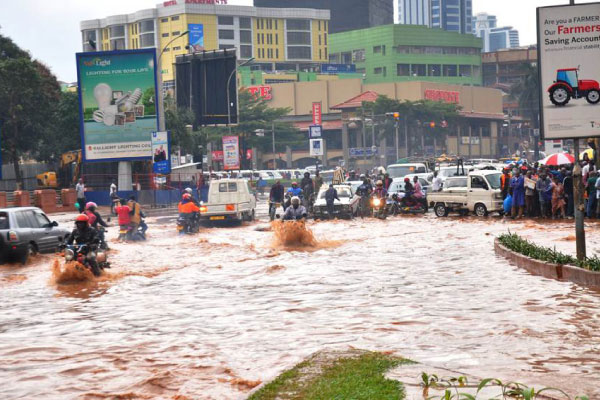Prime
Belgium, EU inject Shs40 billion into climate facility

Motorists drive through the flooded Queen’s Way junction in Kampala recently. FILE PHOTO
What you need to know:
- The funds will be used to raise awareness and build district capacity to mitigate and respond to climate change adaption.
The government of Belgium and the European Union (EU) have committed Shs44 billion to facilitate the Local Climate Adaptive Living Facility (LoCAL) in Uganda.
About Shs25 billion will be contributed by Belgium and an additional Shs15m from the European Union.
LoCAL is an initiative used to channel climate finance to least developed countries and other climate vulnerable countries to mitigate the impact of climate change on communities at the local government level.
ALSO READ: Let’s address climate change in Uganda
Addressing participants during the launch of LoCAL Uganda chapter in Kampala last Thursday, the Local Government minister, Mr Raphael Magyezi, said the grant would be used to raise awareness, build district capacity to mitigate and respond to climate change adaption and integrate climate change issues into their budgets.
Uganda is ranked 166 out of the 181 countries on the Notre Dame Global Adaption Initiative index for vulnerability and readiness for climate change adaption.
This means the country is highly vulnerable and not yet prepared to cope with climate change impacts.
“The communities will be trained on how to handle and manage climate change. For example, issues that affect the environment such as deforestation, bush burning will be handled through sensitisation of community,” Mr Magyezi said.
“There will be also measures that are infrastructural such as protecting communities and institutions from heavy rains, mudslides, improving housing and sanitation in disaster affected areas. This facility is not restrictive. The only thing is for local governments to ensure that the investment menu is related to climate change,” he added.
The minister also advised local governments to undertake climate risk and vulnerability assessment, develop adaption action plans and integrate them in the district development plans for efficient and effective implementation of the project.
The commissioner of Climate Change Department in the Ministry of Water and Environment, Ms Margaret Athieno Mwebesa, said extreme weather event manifested in more erratic rainfall, prolonged dry seasons, floods, and mudslides that negatively impacted on the economy.
“The impacts of climate change in Uganda are demonstrated by the 2015 Economic Assessment report which estimates that climate change damages in the sectors of agriculture, water, infrastructure and energy amounts to 2 to 4 percent of the country’s Gross Domestic Product for 2010-2050,” Ms Athieno said.
The head of cooperation at the European Union Delegation in Uganda, Ms Caroline Adriaensen, said whereas donors and politicians are usually trapped into planning and implementing at global, regional and national levels, effects of climate change hit hardest at the district, community and family levels.
“These are the critical entry points that LoCAL mechanism focuses on to build resilience of local communities,” Ms Adriaensen said.
Minister warns on funds misuse
Local Government minister Raphael Magyezi said LoCal will first be piloted in the disaster prone districts of Kasese, Nwoya, Nebbi, and Zombo. Support to other districts will depend on the achievements made in the pilot districts for three years. Mr Magezi urged the leadership in the pilot districts to desist from corruption and ensure that the money is put to proper use.
“Don’t let us down. You cannot receive a facility like this one and you fail to show cause. If we succeed in the pilot districts, our partners have assured us of more funding, technical assistance and training. Your annual reports should portray good implementation of activities,” he said. Mr Magezi described corruption as a pandemic but promised that his ministry would minimise it.
“It is important that we fight corruption in government programmes. The parish development model, for example cannot succeed if we are corrupt. I have cautioned the parish chiefs and the community development officers not to ask for money from community members seeking to form Saccos,” he said.




